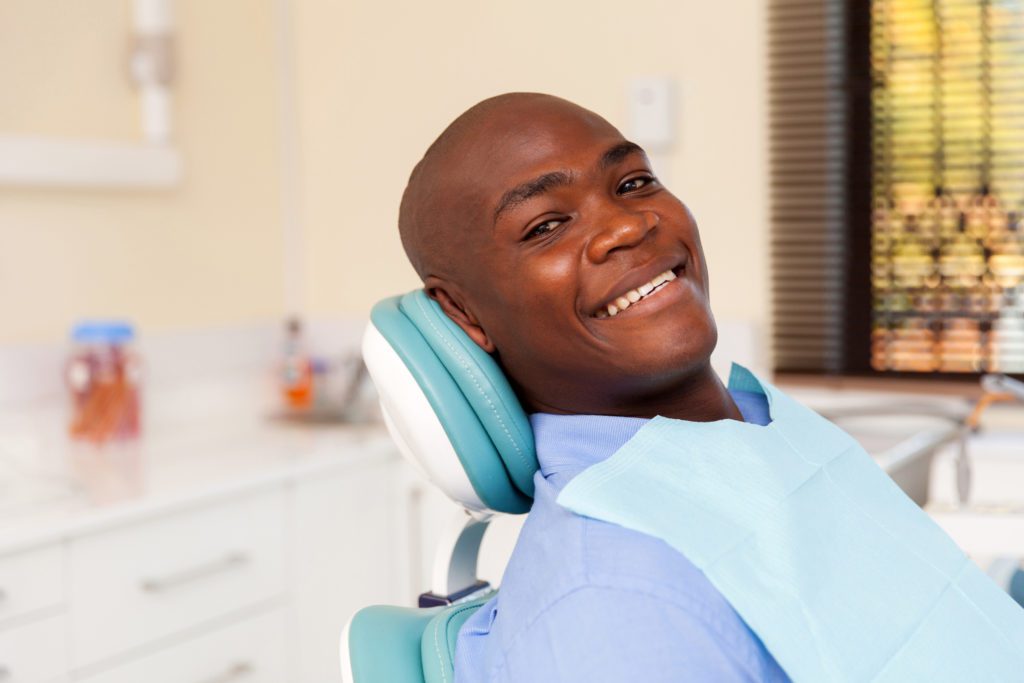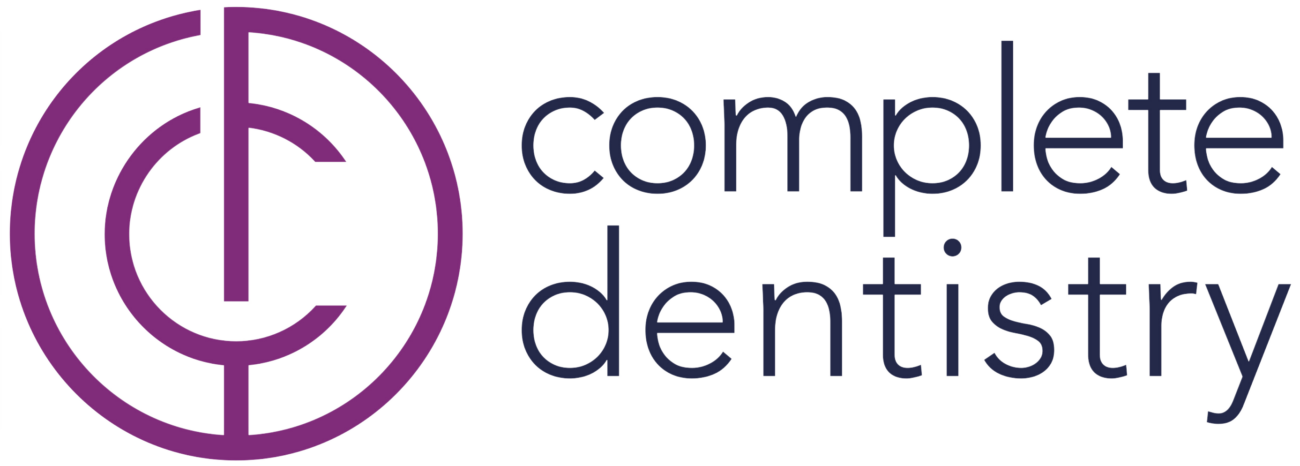Tooth enamel is surprisingly one of the strongest substances. Enamel is the hard, outer shell that covers each tooth. This durable shield is very important because it protects the teeth from decay. Even though it is very tough, it does have limits. Unfortunately, if a tooth’s enamel is destroyed, the body does not replace it like many other parts of the body.
Despite the tooth being covered in this tough substance, it is not indestructible. It is actually common for people to get small chips in their teeth. A few causes of this dental concern include teeth grinding or a dental injury. Our dentists at Complete Dentistry For All Ages help patients with chipped teeth in Lexington, KY.

Chipped Tooth Repair & Treatment
Dr. Chambers offers several treatments to repair your chipped tooth. Treatment will be determined by the severity of the damage. A small chip can most likely be repaired in one visit but larger chips may require several visits to fix.
Dental Filling
If you only chipped a small piece of enamel, Dr. Chambers can repair it with a simple dental filling. Depending on the severity of the damage, we may use either a direct or indirect filling to repair the chipped tooth. Direct fillings use a composite material that fills the damaged area. We harden direct fillings using a special light, directly bonding it to the tooth. Indirect fillings use a preformed inlay or onlay to fill and repair the chipped tooth. We can complete this common dental procedure in a single visit. To learn about our dental filling procedure, see Dental filling.
Dental Bonding
Our dentist can repair a chipped tooth using dental bonding to restore the shape and appearance of the tooth. Tooth bonding is a quick repair for a chipped tooth, especially if it is one of the front teeth. During the procedure, Dr. Chambers will apply a tooth-colored resin directly to the tooth and sculpt it into the desired shape. The resin bonds with the existing tooth structure to restore the natural look of the tooth.
This is an inexpensive treatment that we can complete in a single visit, however it is not a permanent repair. To learn why, and other factors that go into this procedure, visit Dental bonding.
Porcelain Veneers
Dental veneers offer a more permanent solution for chipped teeth. A tooth veneer is an ultra-thin shell that our dentist bonds to the front of a tooth to hide the damage. Our porcelain veneers look very natural. This is because porcelain is extremely durable and stain resistant and can match any color and shape, which allows it to blend seamlessly with your natural smile.

Additionally, as it’s a ceramic material, it will catch the light in the same way as your natural tooth enamel, making your smile look natural and brighter. This treatment will take about two to three appointments to complete. To learn about our veneer options, see Porcelain veneers.
Dental Crown
We use dental crowns to cap a tooth that has significant chips and damage. A dental crown covers and strengthens the tooth, improves the appearance of the chipped tooth, and restores it to its original shape and size. It will also help protect the chipped tooth from further damage and decay.
Dr. Chambers will place a custom dental crown over the chipped tooth to restore its strength and prevent further damage. This treatment will require two to three office visits to complete. To learn more about our dental crown process, see Dental crowns.
If you have a chipped tooth, it is important to know what to do to restore the tooth to its original state. Dr. Chambers offers comprehensive dental treatments to restore a tooth that has been chipped. Most people will know they have a chipped tooth because they can easily feel the jagged edge with their tongue. Other symptoms include pain when biting down and irritation around the gums.
What To Do If You Have a Chipped Tooth
A small chip in your tooth may not seem like an emergency but it actually should be looked at as soon as possible. Most of the time it won’t even hurt but the true damage comes from ignoring the problem. Waiting to treat any teeth that are chipped may lead to further dental problems. It could become infected or allow bacteria to enter the tooth canal.
This can cause a lot of pain and possibly even lead to tooth loss. If any of your teeth become chipped, you should contact the office of Dr. Chambers to have it looked at as soon as possible. She will be able to diagnose and determine the severity of the teeth that are chipped with a visual exam.

Chipped Tooth FAQs
Learn more about chipped teeth below.
Can a chipped tooth heal on its own?
No, a chipped tooth cannot heal on its own because tooth enamel does not regenerate. While minor chips might not cause immediate problems, it’s important to have a dentist evaluate the damage to prevent further issues. Over time, a chipped tooth may worsen, leading to increased sensitivity, pain, or a larger fracture that could require more extensive treatment.
Is it possible to prevent chipped teeth?
While not all chipped teeth can be prevented, you can take steps to reduce the risk. Avoid chewing on hard objects like ice, pencils, or hard candy, and wear a mouthguard if you play contact sports. If you grind your teeth at night, using a night guard can help protect your teeth from damage. Regular dental visits also ensure that any potential weaknesses in your teeth are identified early.
Can a chipped tooth cause bad breath?
A chipped tooth by itself does not typically cause bad breath, but if the chip exposes the inner layers of the tooth or creates a space where food particles can get trapped, it may contribute to unpleasant odors. Additionally, if the tooth becomes infected due to untreated damage, bacteria can accumulate and cause bad breath. It’s important to keep the area clean and address the chip with dental treatment to prevent further oral health issues.
Can a chipped tooth affect my bite?
A chipped tooth can affect your bite, especially if the chip is large or involves a molar. When the shape of the tooth changes, it can alter how your upper and lower teeth come together, causing uneven pressure during chewing. If left untreated, this can lead to discomfort, jaw pain, or even additional dental problems. It’s important to have a chipped tooth evaluated to ensure your bite remains balanced and functional.
What should I do if I chip a tooth?
If you chip a tooth, rinse your mouth with warm water to clean the area and apply a cold compress to reduce swelling or pain. To prevent further damage, avoid chewing on the side of the chipped tooth. You can use dental wax or a temporary dental filling from a pharmacy to cover any sharp edges until you can see a dentist, who will determine the best course of treatment.
What are the risks of leaving a chipped tooth untreated?
Leaving a chipped tooth untreated can lead to several complications, including increased sensitivity, pain, or further damage. A chip that exposes the tooth’s pulp can increase the risk of infection. Over time, untreated chips may cause the tooth to break more severely, which could require more invasive treatments, such as a root canal or extraction.
Schedule a Dental Appointment Today
Contact Complete Dentistry For All Ages for chipped tooth treatment today at 859-251-3809. You can also request a dental consultation with our dentist on our website.
